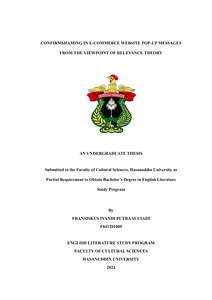SUCIADI, FRANSISKUS IVANDI PUTRA (2024) CONFIRMSHAMING IN E-COMMERCE WEBSITE POP-UP MESSAGES FROM THE VIEWPOINT OF RELEVANCE THEORY = CONFIRMSHAMING IN E-COMMERCE WEBSITE POP-UP MESSAGES FROM THE VIEWPOINT OF RELEVANCE THEORY. Skripsi thesis, Universitas Hasanuddin.
![[thumbnail of Cover]](/44795/1.hassmallThumbnailVersion/F041201009_skripsi_18-07-2024%20cover1.png)

F041201009_skripsi_18-07-2024 cover1.png
Download (197kB) | Preview
F041201009_skripsi_18-07-2024 1-2(FILEminimizer).pdf
Download (1MB)
F041201009_skripsi_18-07-2024 dp(FILEminimizer).pdf
Download (560kB)
F041201009_skripsi_18-07-2024(FILEminimizer).pdf
Restricted to Repository staff only until 4 March 2027.
Download (1MB)
Abstract (Abstrak)
This thesis aims to investigate confirmshaming in e-commerce website pop-up messages using Relevance Theory by exploring how users perceive and respond to these messages and identifying the factors that influence their relevance perceptions. The study used a qualitative approach and employed thematic analysis to examine responses from a questionnaire given to online shoppers aged 18-64. The findings reveal that most users perceive confirmshaming negatively, feeling disrespected by the guilt-inducing language in the "No" options, which often results in a negative impression of the website and a desire to leave. However, some users find these messages casual, funny, and interesting, leading to a more positive response. The relevance of confirmshaming messages in e-commerce website pop-up messages is influenced by the balance between processing effort and cognitive effects, with less effort and greater benefits perceived as more relevant. Experienced users often see the strategy as manipulative, while less experienced users may respond positively. Contextual factors, such as user goals and offer value, also shape responses. The study suggests that e-commerce sites should use clear and respectful communication to enhance user experience and protect brand reputation.
Keyword : Confirmshaming, E-Commerce, Relevance Theory, User Experience, Cyberpragmatics, Deceptive Pattern
| Item Type: | Thesis (Skripsi) |
|---|---|
| Uncontrolled Keywords: | Confirmshaming, E-Commerce, Relevance Theory, User Experience, Cyberpragmatics, Deceptive Pattern. |
| Subjects: | P Language and Literature > PR English literature |
| Divisions (Program Studi): | Fakultas Ilmu Budaya > Bahasa Inggris |
| Depositing User: | Rasman |
| Date Deposited: | 11 Jun 2025 02:51 |
| Last Modified: | 11 Jun 2025 02:51 |
| URI: | http://repository.unhas.ac.id:443/id/eprint/44795 |


